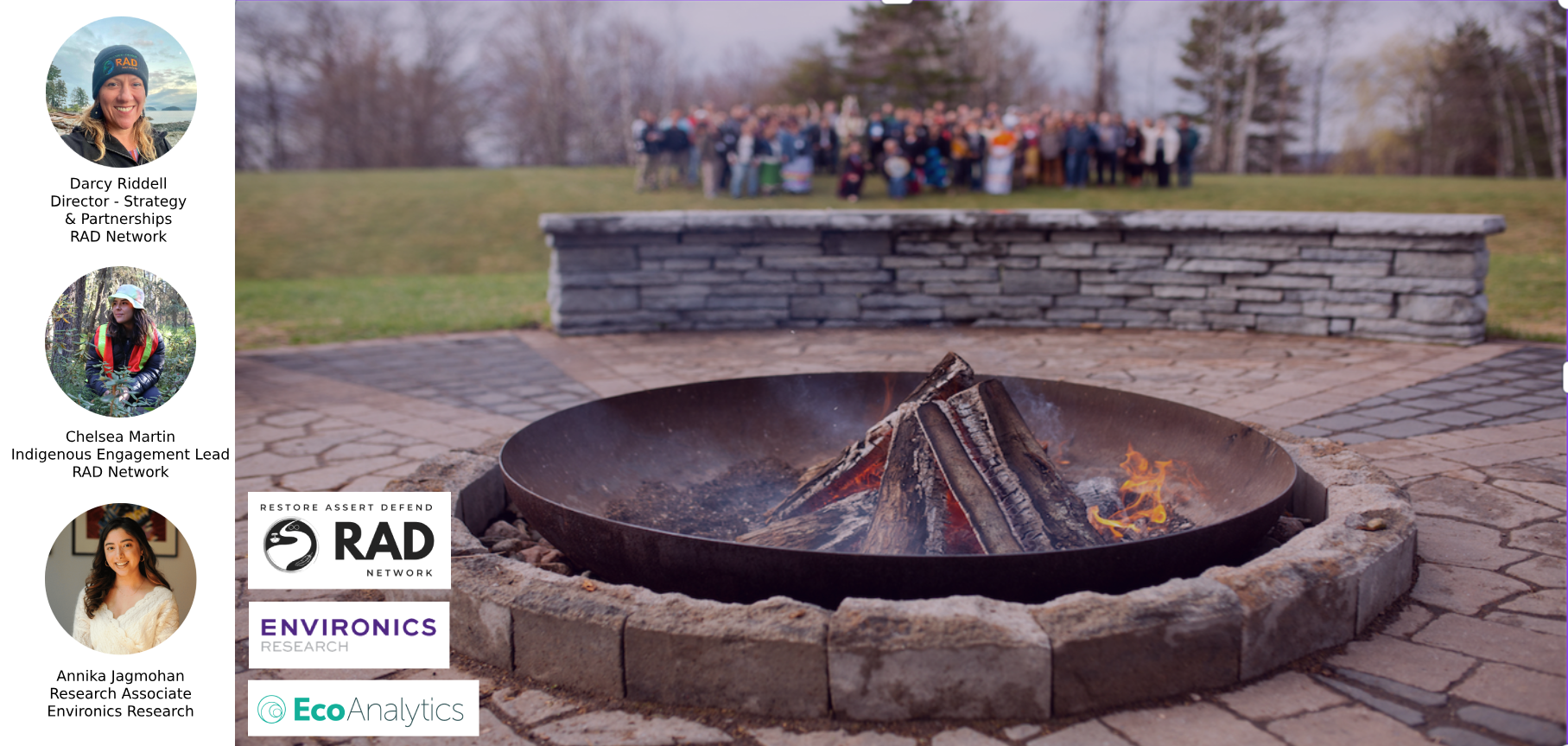
Date: December 2, 1-2 PM ET
Cost: Free (Zoom Webinar)
*All registrants will be provided with a link to the recording and presentation slides following the session. The recording will be available for 60 days.
.png)

.png)
Organizations working on conservation and stewardship of lands and waters are increasingly building partnerships with Indigenous nations and community members, supporting fundraising, providing technical capacity, and partnering in a diverse number of ways.
Join RAD Network, EcoAnalytics and Environics as we release new research on ENGO financial practices in relation to Indigenous communities, which identifies tangible ways to more powerfully align with commitments to reconciliation. The research builds on previous work to decolonize conservation practices and environmental philanthropy, to specifically examine financial relationships between Indigenous nations, organizations or individuals, and ENGOs.
We will share highlights of our findings on financial partnerships, contracts and intellectual property, provision of in-kind technical supports, the spectrum of advisory and decision-making roles, and examples of innovative organizational structures.
We'll cover practical steps and strategies that respect Indigenous rights and reduce colonial barriers embedded in financial and administrative practices, and introduce a self-survey tool for leaders to bring back into organizations.

Our Presenters

Annika Jagmohan is a Research Associate with Environics Research. Annika is a detail-oriented researcher with a knack for drawing out themes and finding the story in quantitative and qualitative research. Her background in business and marketing provide a strong foundation for carrying out meaningful analyses, impactful reports, and strategic recommendations. Her work with Environics has allowed her to gain exposure to a wide variety of sectors and build her skills in the design and implementation of market research projects.

Chelsea Martin is the Indigenous Engagement Lead at RAD Network. Chelsea is of mixed ancestry on her mothers side, Ojibway on her fathers side and is a proud member of the Chippewas of Nawash Unceded First Nation, living in Treaty 6 Territory in Amiskwacîwâskahikan (Beaver Hills House - now known as Edmonton). She is a dedicated advocate for Indigenous-led stewardship and believes it is her responsibility to advocate for a future where Indigenous rights and conservation efforts are inseparable. With a background spanning government, non-profits, and academia, she works to ensure Indigenous leadership and voices are at the forefront of environmental stewardship.

Darcy Riddell is Director of Strategy and Partnerships at RAD Network. Dr. Darcy Riddell is a fifth generation British Columbian, living with her two children in Tsleil-Waututh, Musqueam and Squamish territories. Darcy has worked to advance justice and protect nature with environmental organizations, capacity-building initiatives, philanthropy, and Indigenous-led organizations. She specializes in strategy, convening, collaboration and transformative learning, in service to the complex contexts of conservation and Indigenous stewardship. She has worked to decolonize funding and conservation practice in previous roles including as BC Program Director at Makeway, Director of Strategic Learning at McConnell Foundation, and Program Director with Hollyhock Leadership Institute.

Session 1: Settler Colonialism 101
Introduce ENGO representatives to the fact that colonization is a structure and not an event. Identifies key ways that colonialism moves through individuals and organizations.
Session 2: Positionality
ENGO representatives learn how to articulate their social location within a settler colonial state, and in relation to potential Indigenous partners.
Session 3: Inherent Indigenous Governance 101
Introduce the fact that Indigenous nations have their own sources of political authority that they can (and do) draw on when addressing environmental issues. Examples provided.
Session 4: Building Better Relations
ENGO representatives will road test ways they can implement previous workshop key points to re-imagine partnerships with Indigenous nations.
Cost: $100 (or register 4 staff from the same organization for one stream and get the 5th registration free)
All registrants will be provided with a link to access the recordings and presentation slides for 60 days following each session.

Session 1: Diagnosing Settler Colonialism in the Enviro Sector
Participants will be asked to share ways in which they have diagnosed and traced power in social justice movements and/or in the ENGO sector. This workshop will make space for discomfort as part of promoting decolonization.
Session 2: Inherent Indigenous Governance
A mix of advanced and introductory theory, this workshop delves into legal and political pluralism, naming the fact that Indigenous nations have their own sources of political authority that they can (and do) draw on when addressing environmental issues.
Session 3: The Nonprofit Industrial Complex
ENGO participants are introduced to theories and examples describing the Nonprofit Industrial Complex and the “Shadow State.” Purpose is to show how settler colonialism structures civil society.
Session 4: Decolonizing ENGO-First Nation Partnerships
This workshop delves deep into how ENGOs can partner with Indigenous nations beyond the Nonprofit Industrial Complex while promoting deference to inherent Indigenous political leaders.
Cost: $100 (or register 4 staff from the same organization for one stream and get the 5th registration free)
All registrants will be provided with a link to access the recordings and presentation slides for 60 days following each session.

The Indigenous only space will be collaborative in nature but critical in approach. This track is a space for Indigenous folks within the ENGO sector to come together to discuss their experiences and work, with an eye to taking a position on what the sector might need to do in order to promote decolonization. Participants will use the first session to define our goals for the remaining three meetings. Therefore, session topics named here are proposals only.
Session 1: Naming the Cannibal: Settler Colonialism in the ENGO Sector
Session 2: Proposed topic: Reflections on working in the ENGO Sector
Session 3: Proposed topic: Centering Indigenous Thought in the ENGO Sector
Session 4: Proposed topic: Visioning a Decolonial Environmental Sector
Cost: Free
